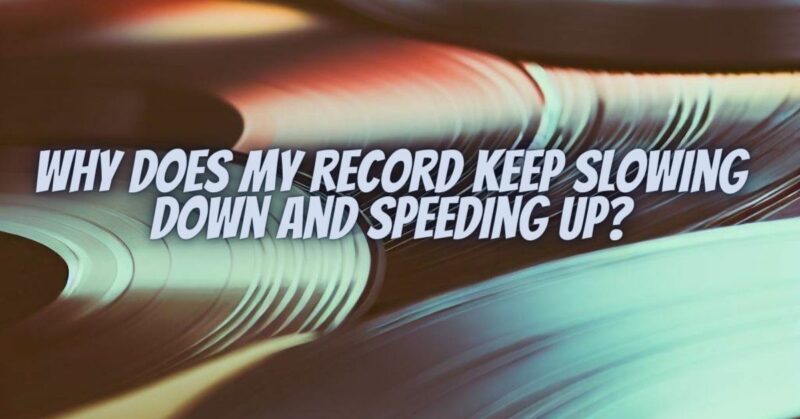If your record is slowing down and speeding up, there are a few things you can do to troubleshoot and fix the issue:
1. Check the speed setting. Make sure that the record player is set to the correct speed for the record you are playing. 7-inch records are typically played at 45 RPM, while 10-inch and 12-inch records are typically played at 33 1/3 RPM.
2. Inspect the belt. The belt on a record player is responsible for driving the turntable platter. If the belt is worn or damaged, it will cause the turntable to run at different speeds. To inspect the belt, remove the platter and inspect the belt for signs of wear or damage. If the belt is worn or damaged, replace it.
3. Align the cartridge. If the cartridge is not properly aligned, the stylus will not track the grooves in the record correctly, which can cause the record to play at different speeds. To align the cartridge, follow the manufacturer’s instructions.
4. Clean the turntable. A dirty turntable can cause the stylus to skip or drag, which can also cause the record to play at different speeds. To clean the turntable, clean the platter and mat with a soft brush to remove any dust or dirt. You can also use a record cleaning solution to clean the turntable.
5. Inspect the stylus. A worn or damaged stylus can also cause the record to play at different speeds. To inspect the stylus, use a magnifying glass to look for signs of wear or damage. If the stylus is worn or damaged, replace it immediately.
6. Flatten a warped record. A warped record can cause the stylus to skip or drag, which can also cause the record to play at different speeds. To flatten a warped record, try placing it on a flat surface and weighing it down with a heavy object for a few days. If the record is still warped after that, you may need to replace it.
7. Check for mechanical problems with the record player. In some cases, a record player that is slowing down and speeding up may have a mechanical problem, such as a problem with the motor or the drive train. If you have tried all of the above and the record player is still slowing down and speeding up, then there may be a more serious problem with your record player and you will need to take it to a qualified technician for repair.
Additional tips
- If you are not sure what the problem is, you can try playing a different record. If the different record plays without any problems, then the problem is most likely with the original record.
- You can also try cleaning the record itself. To do this, use a record brush and record cleaning solution. Be careful not to touch the playing surface of the record with your fingers, as this can leave fingerprints and oils that can degrade the record over time.
- If you have tried all of the above and the record is still slowing down and speeding up, then you may need to take it to a qualified technician for repair.
Here are some additional tips to help prevent your records from slowing down and speeding up:
- Store your records properly. Store your records in a cool, dry place away from direct sunlight and heat sources.
- Handle your records carefully. Avoid dropping or bumping your records, as this can damage them.
- Replace your stylus regularly. Replace your stylus every 1,000 hours of use or sooner if it shows signs of wear or damage.
- Clean your record player regularly. Clean your record player platter and mat with a soft brush to remove any dust or dirt. You can also use a record cleaning solution to clean the record player.
By following these tips, you can help to ensure that your records play smoothly and sound their best.


